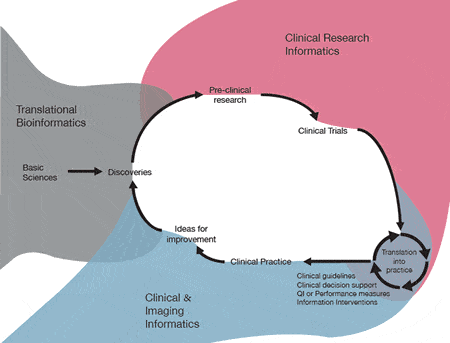
If new biomedical discoveries are like gold, to borrow the metaphor used by Meredith Zozus, Ph.D., the prospecting days are fast coming to an end. A new associate professor in the rapidly expanding Department of Biomedical Informatics (DBMI), Zozus was explaining UAMS’ recent and forthcoming biomedical informatics strategies to benefit clinicians, biomedical researchers and graduate students.
The need for managing enormous amounts of data and meeting the NIH’s new, higher expectations for rigor and study reproducibility are helping drive UAMS’ efforts for more robust data management systems. Another factor is the increasing difficulty compared to 20 years ago for a clinical researcher to make a single discovery that improves health outcomes, Zozus said.
“Back then, finding those gold nuggets was a lot easier. You could do a large study and learn something new that changed clinical practice and improved outcomes,” she said. “But those gold nuggets have become harder to find. So, like real-life prospectors, we’re moving from panning for gold to computationally sifting through tons of data to find the nuggets.”
Zozus also noted that the NIH, through its Big Data to Knowledge (BD2K) initiative, is targeting a growing shortage in biomedical research of individuals with computational expertise, informatics and statistics, with enough understanding of the underlying biology, biochemistry or physiology to really collaborate with a biomedical scientist. The challenge is particularly acute for extremely large datasets, where different methods are needed.
To help ensure UAMS is a leader in biomedical informatics, Fred Prior, Ph.D., who chairs DBMI and leads TRI’s Comprehensive Informatics Resource Center, recently announced new – some nationally unique – education initiatives to the TRI Leadership Council. Together the initiatives cover the translational spectrum, from molecules to populations. Pending approval from the Arkansas Department of Higher Education (ADHE), and starting in fall 2017, these four tracks in different areas of Biomedical Informatics will offer certificates, master’s degrees and doctorates:
Translational Bioinformatics. This degree program is for researchers using data in cellular and molecular level studies that have a clinical target, e.g., a study of genes producing a protein that has a role in disease. The field also encompasses work with pre-clinical data as development and testing begins for new targets, compounds or devices.
Imaging Informatics. Training in Imaging Informatics, offered only a few places nationally, includes coursework in research imaging to teach the latest modalities and methods of managing and interpreting images used in research. It also includes coursework for imaging professionals, i.e., those who run a hospital’s picture, archiving and communication (PAC) system where images such as CT scans, X-rays, and MRIs are stored.
Clinical Informatics. This program is for those interested in generation, management and use of information in health care settings, i.e., clinical decision support or algorithms to predict patients who are likely to respond well to treatment. Clinical informatics is a medical subspecialty approved in 2011 by the American Board of Medical Specialties. DBMI ran its first review course this summer to help physicians sitting for the clinical informatics board exam. The review class will be offered again this summer as a free service to all physicians in Arkansas who want to sit for the exam. Other plans include a fellowship in clinical informatics.
Clinical Research Informatics. If approved by ADHE, UAMS may be the first program to offer graduate degrees in Clinical Research Informatics in the United States.
Clinical research informatics involves data for the design, conduct and reporting of clinical studies. While easily confused with clinical informatics, clinical research informatics is not research on clinical informatics; instead, it is the informatics of research, i.e., how information is used in gauging the feasibility, or in designing, conducting or reporting clinical studies. If approved by ADHE this spring, the Clinical Research Informatics track will include a master’s degree and Ph.D. as well as a professional master’s option.
All four tracks will have the option of distance learning.
DBMI and TRI will also continue the Research & Application Seminar Series, which is open to the public and offers an hour of CME credit to clinical and informatics professionals across the state for attending seminars on the latest biomedical research tools and practices.
While biomedical informatics is not new to UAMS, it is increasingly approaching the data as a science, considering its fundamental properties and how those should govern its management, Zozus said.
“As an institution we are increasingly providing collaboration, informatics expertise and data infrastructure to biomedical researchers at all scales, from the smallest to the largest of studies, so our investigators don’t have to build their own data processes,” she said. “In essence, we are building a data sluice operation.
